Analysis of the Evolution of Management Theory and Practice
VerifiedAdded on 2022/12/26
|16
|1260
|96
Report
AI Summary
This report provides a comprehensive overview of the evolution of management theory and practice, exploring key concepts such as Total Quality Management (TQM), Just-in-Time (JIT) and Lean processes, and bureaucracy. It examines the role of technological innovation as a driver of change, alongside environmental and sustainability issues. The report uses Tesco as a case study to illustrate the application of these management approaches in a real-world multinational retail context. Furthermore, it addresses the impact of the end of capitalism and the emergence of post-capitalism on organizations and the economy. The report also discusses the challenges associated with implementing these theories, such as employee resistance to change and the importance of waste management. The conclusion highlights the significance of these strategies and techniques in organizational development and sustainability.

EVOLUTION OF MANAGEMENT THEORY
AND PRACTICE
AND PRACTICE
Paraphrase This Document
Need a fresh take? Get an instant paraphrase of this document with our AI Paraphraser
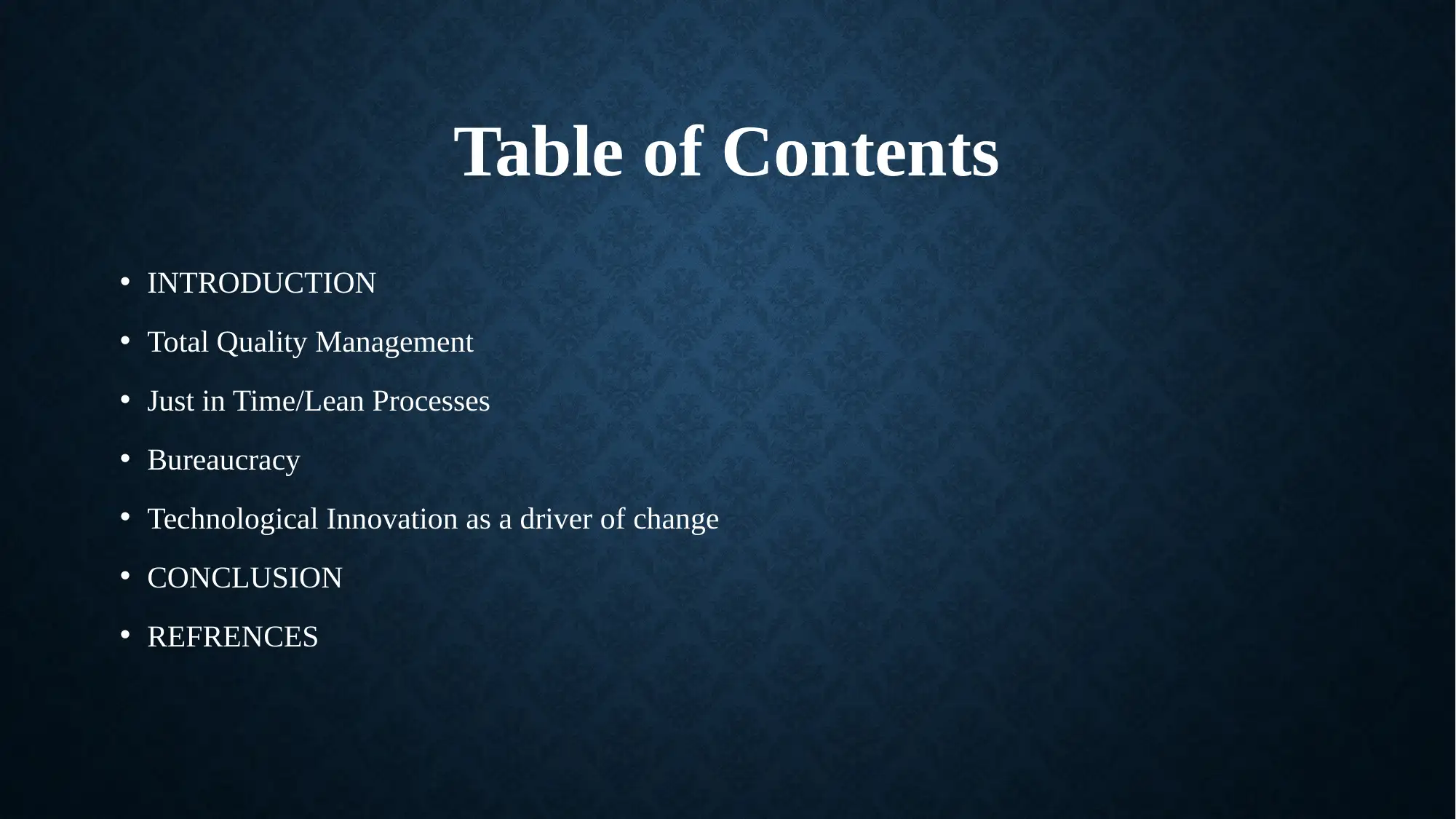
Table of Contents
• INTRODUCTION
• Total Quality Management
• Just in Time/Lean Processes
• Bureaucracy
• Technological Innovation as a driver of change
• CONCLUSION
• REFRENCES
• INTRODUCTION
• Total Quality Management
• Just in Time/Lean Processes
• Bureaucracy
• Technological Innovation as a driver of change
• CONCLUSION
• REFRENCES
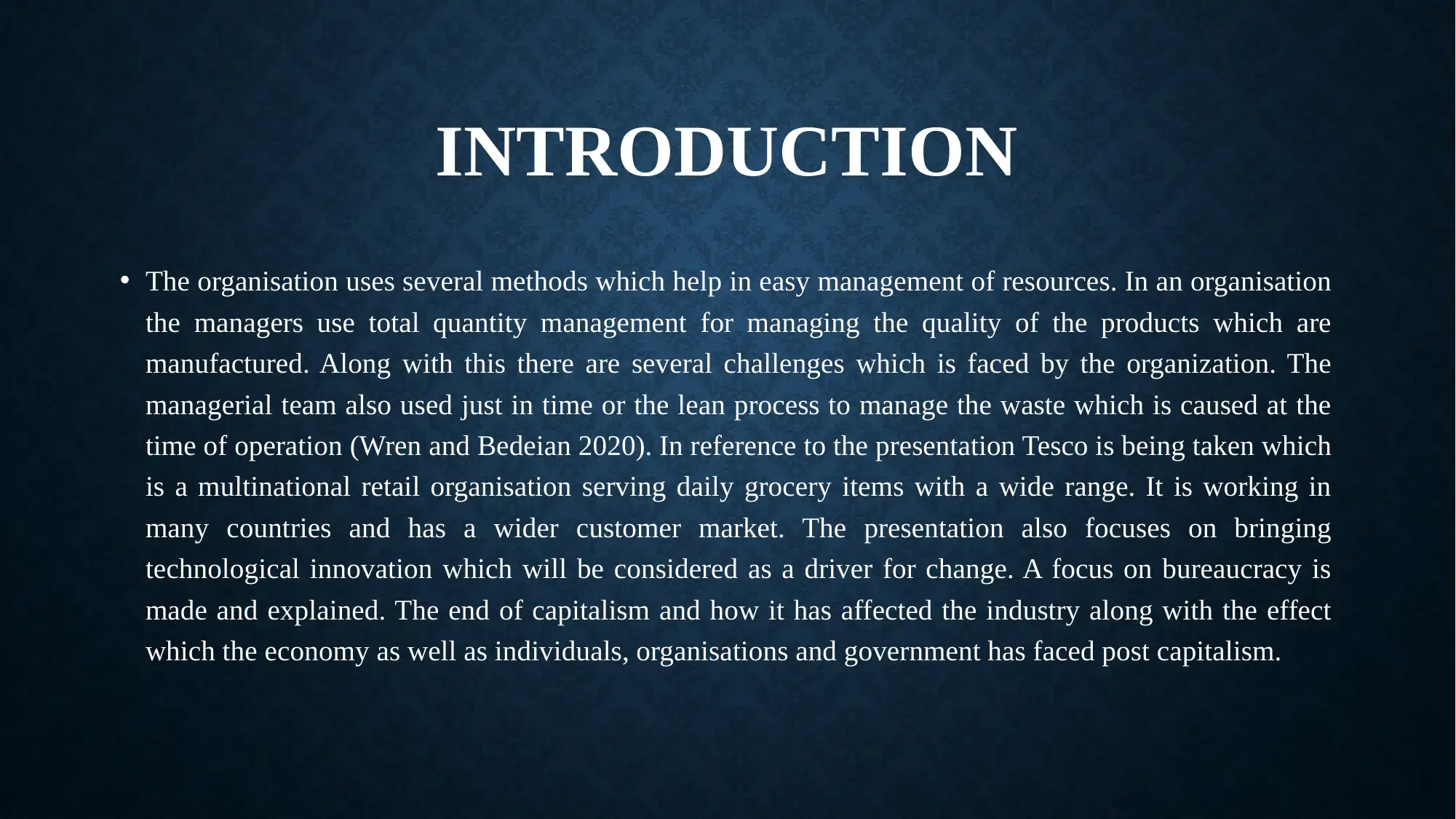
INTRODUCTION
• The organisation uses several methods which help in easy management of resources. In an organisation
the managers use total quantity management for managing the quality of the products which are
manufactured. Along with this there are several challenges which is faced by the organization. The
managerial team also used just in time or the lean process to manage the waste which is caused at the
time of operation (Wren and Bedeian 2020). In reference to the presentation Tesco is being taken which
is a multinational retail organisation serving daily grocery items with a wide range. It is working in
many countries and has a wider customer market. The presentation also focuses on bringing
technological innovation which will be considered as a driver for change. A focus on bureaucracy is
made and explained. The end of capitalism and how it has affected the industry along with the effect
which the economy as well as individuals, organisations and government has faced post capitalism.
• The organisation uses several methods which help in easy management of resources. In an organisation
the managers use total quantity management for managing the quality of the products which are
manufactured. Along with this there are several challenges which is faced by the organization. The
managerial team also used just in time or the lean process to manage the waste which is caused at the
time of operation (Wren and Bedeian 2020). In reference to the presentation Tesco is being taken which
is a multinational retail organisation serving daily grocery items with a wide range. It is working in
many countries and has a wider customer market. The presentation also focuses on bringing
technological innovation which will be considered as a driver for change. A focus on bureaucracy is
made and explained. The end of capitalism and how it has affected the industry along with the effect
which the economy as well as individuals, organisations and government has faced post capitalism.
⊘ This is a preview!⊘
Do you want full access?
Subscribe today to unlock all pages.

Trusted by 1+ million students worldwide
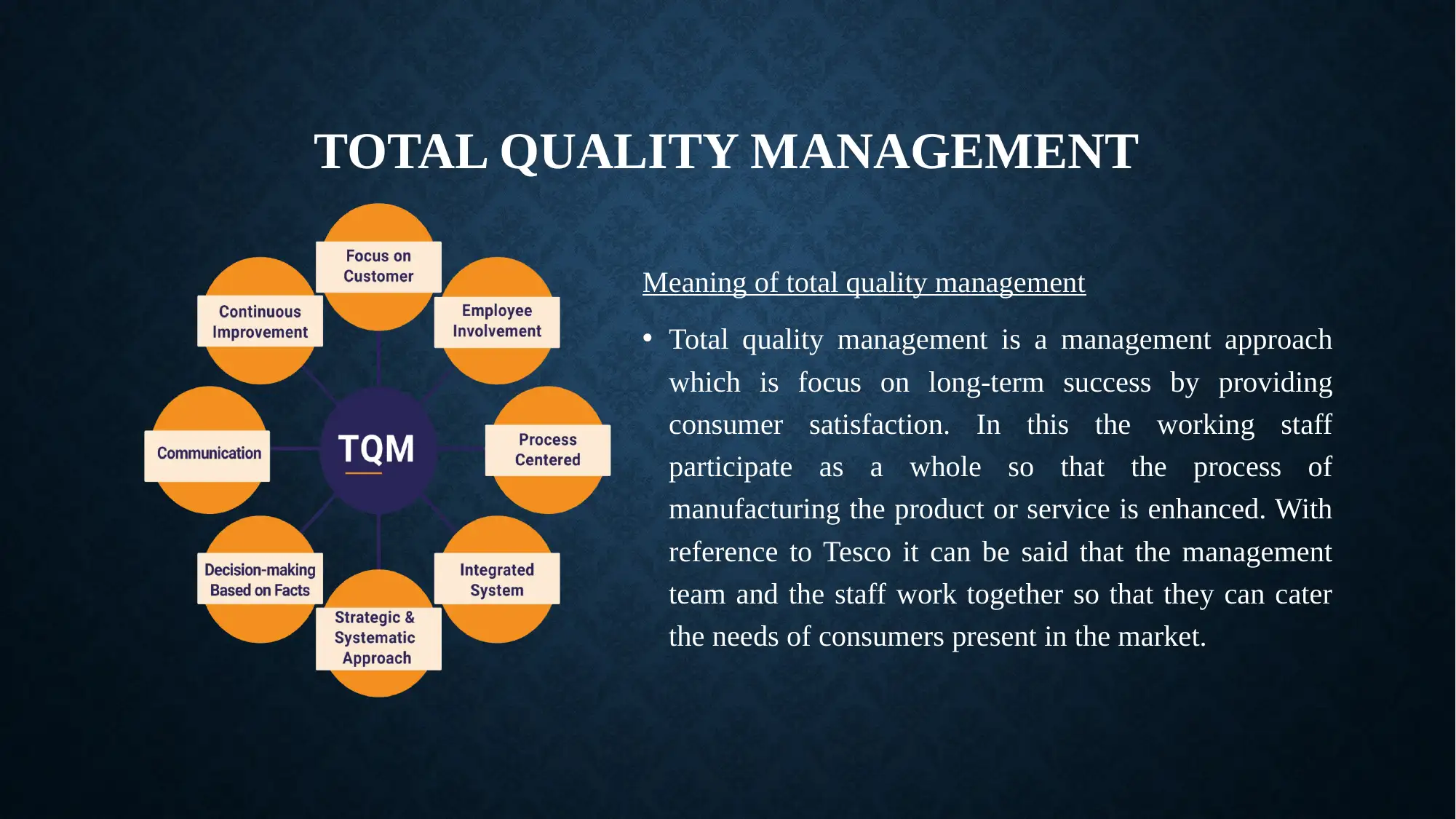
TOTAL QUALITY MANAGEMENT
Meaning of total quality management
• Total quality management is a management approach
which is focus on long-term success by providing
consumer satisfaction. In this the working staff
participate as a whole so that the process of
manufacturing the product or service is enhanced. With
reference to Tesco it can be said that the management
team and the staff work together so that they can cater
the needs of consumers present in the market.
Meaning of total quality management
• Total quality management is a management approach
which is focus on long-term success by providing
consumer satisfaction. In this the working staff
participate as a whole so that the process of
manufacturing the product or service is enhanced. With
reference to Tesco it can be said that the management
team and the staff work together so that they can cater
the needs of consumers present in the market.
Paraphrase This Document
Need a fresh take? Get an instant paraphrase of this document with our AI Paraphraser
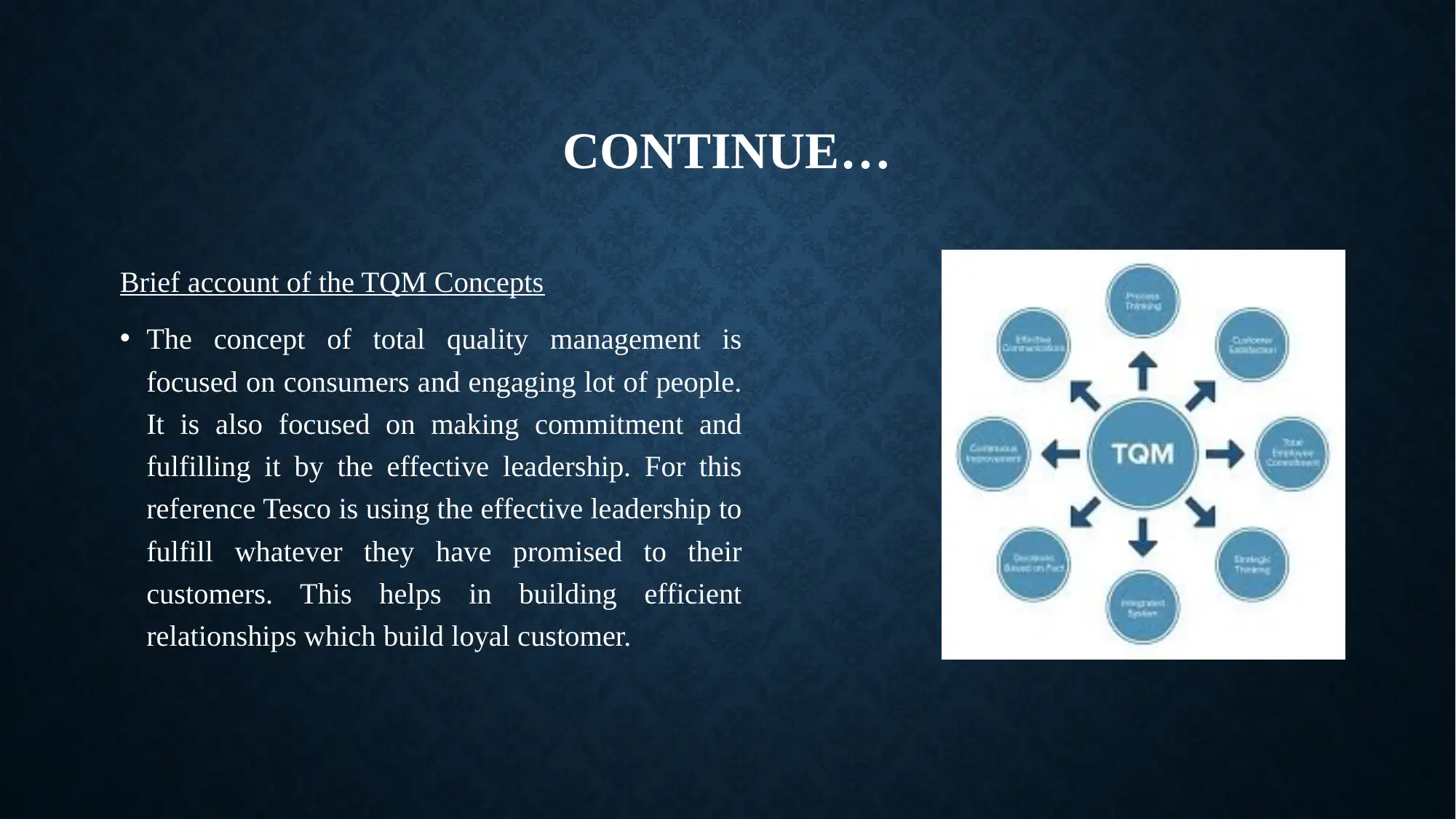
CONTINUE…
Brief account of the TQM Concepts
• The concept of total quality management is
focused on consumers and engaging lot of people.
It is also focused on making commitment and
fulfilling it by the effective leadership. For this
reference Tesco is using the effective leadership to
fulfill whatever they have promised to their
customers. This helps in building efficient
relationships which build loyal customer.
Brief account of the TQM Concepts
• The concept of total quality management is
focused on consumers and engaging lot of people.
It is also focused on making commitment and
fulfilling it by the effective leadership. For this
reference Tesco is using the effective leadership to
fulfill whatever they have promised to their
customers. This helps in building efficient
relationships which build loyal customer.

CONTINUE…
Challenges of TQM
• Every factor faces several challenges in its compliance. Same
way total quality management also faces barriers like
resistance of employees to change, high employee turnover
ratio, lack of human resources, disruption in teamwork, lack
of effective communication, reduction in continuous
improvement which make organisational culture weak. Along
with this there comes lack of coordination between senior
management and lower employees which creates conflicts.
Challenges of TQM
• Every factor faces several challenges in its compliance. Same
way total quality management also faces barriers like
resistance of employees to change, high employee turnover
ratio, lack of human resources, disruption in teamwork, lack
of effective communication, reduction in continuous
improvement which make organisational culture weak. Along
with this there comes lack of coordination between senior
management and lower employees which creates conflicts.
⊘ This is a preview!⊘
Do you want full access?
Subscribe today to unlock all pages.

Trusted by 1+ million students worldwide
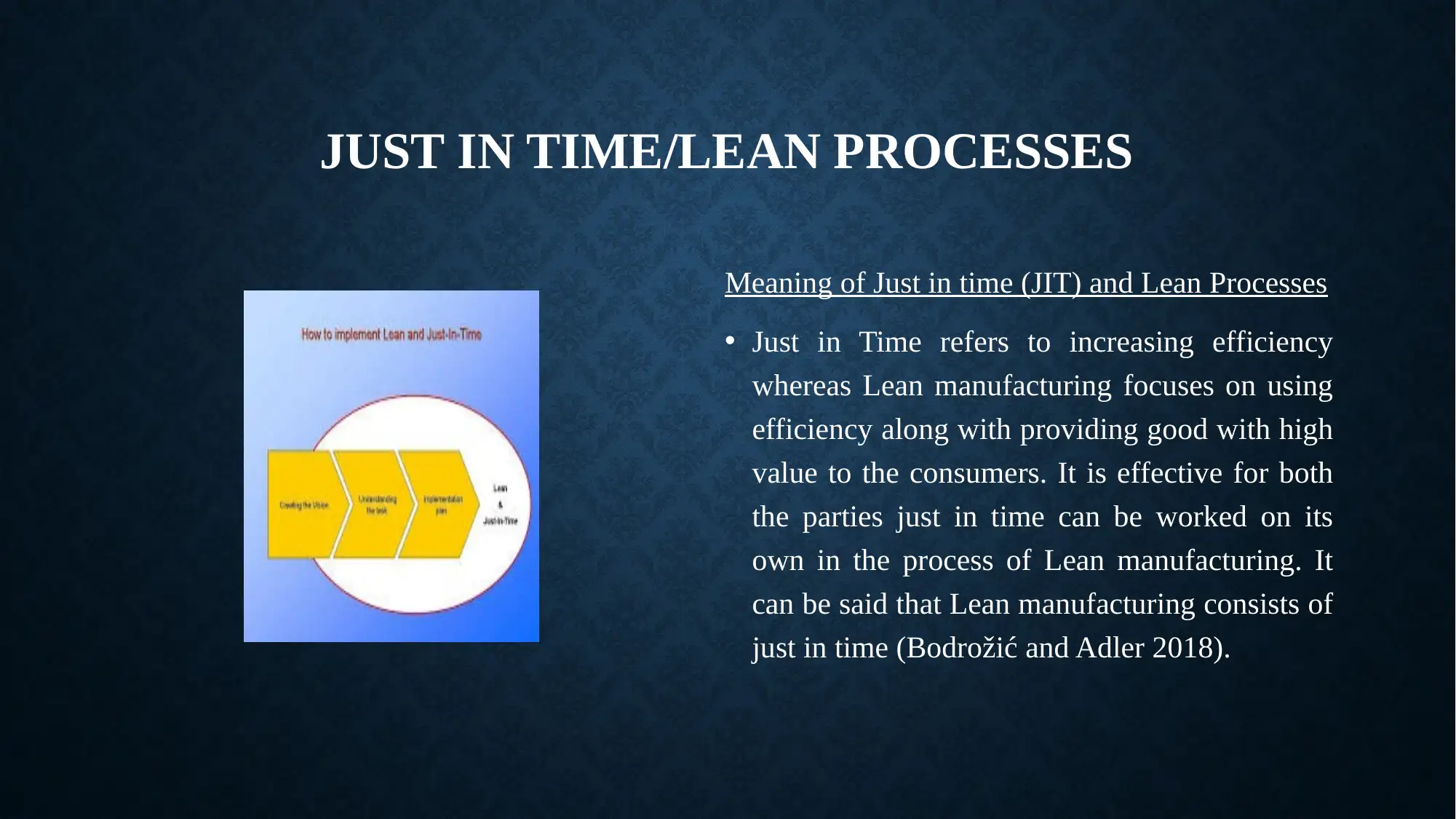
JUST IN TIME/LEAN PROCESSES
Meaning of Just in time (JIT) and Lean Processes
• Just in Time refers to increasing efficiency
whereas Lean manufacturing focuses on using
efficiency along with providing good with high
value to the consumers. It is effective for both
the parties just in time can be worked on its
own in the process of Lean manufacturing. It
can be said that Lean manufacturing consists of
just in time (Bodrožić and Adler 2018).
Meaning of Just in time (JIT) and Lean Processes
• Just in Time refers to increasing efficiency
whereas Lean manufacturing focuses on using
efficiency along with providing good with high
value to the consumers. It is effective for both
the parties just in time can be worked on its
own in the process of Lean manufacturing. It
can be said that Lean manufacturing consists of
just in time (Bodrožić and Adler 2018).
Paraphrase This Document
Need a fresh take? Get an instant paraphrase of this document with our AI Paraphraser

CONTINUE..
Benefit of JIT
• Just in Time reduces the raw
materials or lowers the cost of the
same. Along with this it reduces
the cost of inventory which in the
end affects the cost of finished
good and reduces cost of
production which results in high
revenue generation.
Benefit of JIT
• Just in Time reduces the raw
materials or lowers the cost of the
same. Along with this it reduces
the cost of inventory which in the
end affects the cost of finished
good and reduces cost of
production which results in high
revenue generation.
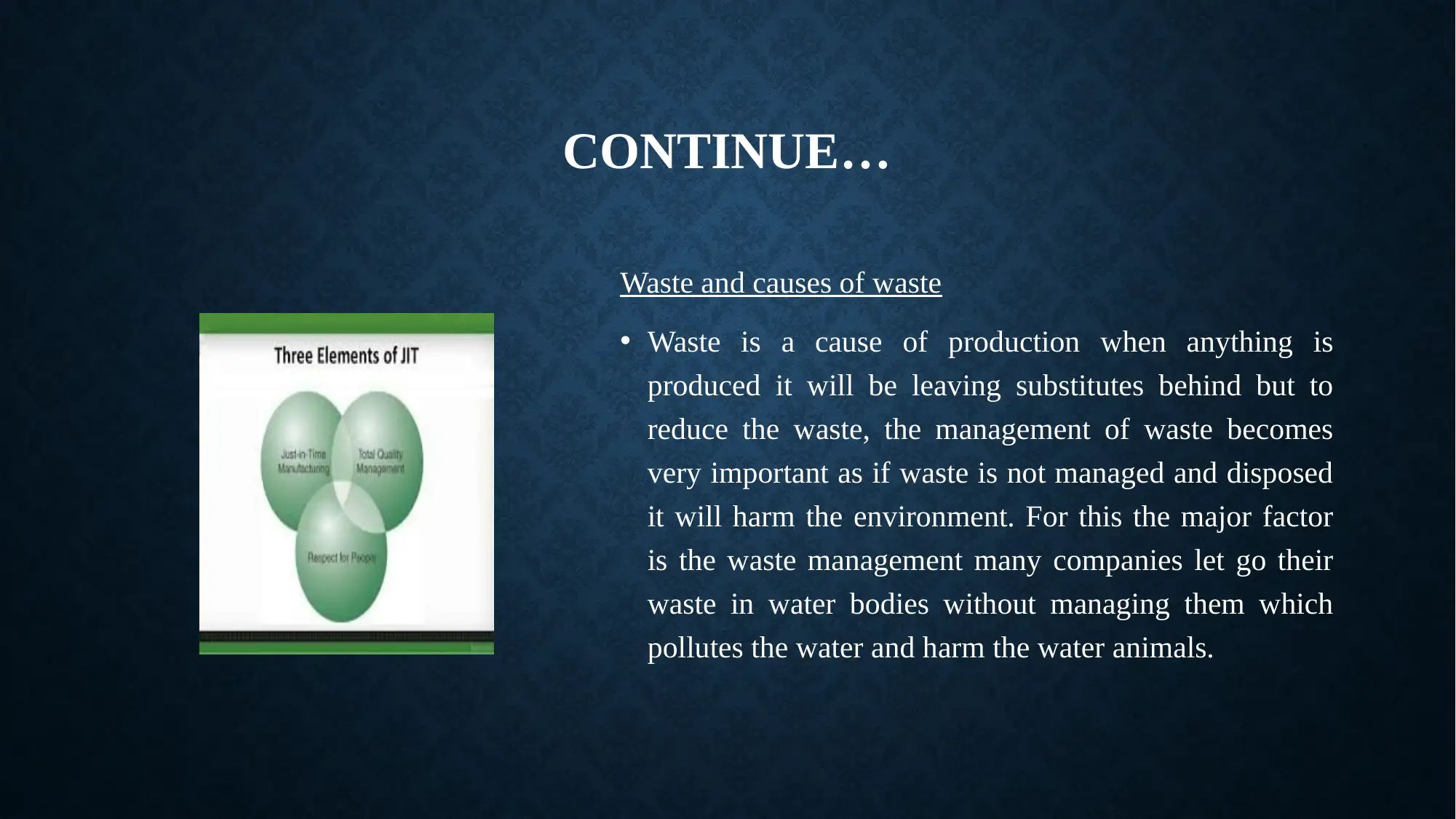
CONTINUE…
Waste and causes of waste
• Waste is a cause of production when anything is
produced it will be leaving substitutes behind but to
reduce the waste, the management of waste becomes
very important as if waste is not managed and disposed
it will harm the environment. For this the major factor
is the waste management many companies let go their
waste in water bodies without managing them which
pollutes the water and harm the water animals.
Waste and causes of waste
• Waste is a cause of production when anything is
produced it will be leaving substitutes behind but to
reduce the waste, the management of waste becomes
very important as if waste is not managed and disposed
it will harm the environment. For this the major factor
is the waste management many companies let go their
waste in water bodies without managing them which
pollutes the water and harm the water animals.
⊘ This is a preview!⊘
Do you want full access?
Subscribe today to unlock all pages.

Trusted by 1+ million students worldwide

CONTINUE…
Problem of Just in Time
• Just-in-time focuses on present goods
rather than finished goods or
previous goods, so it becomes hard to
meet the unexpected orders which
may arise due to any circumstances
as they focus on meeting the actual
orders rather than being responsive to
future uncertainty.
Problem of Just in Time
• Just-in-time focuses on present goods
rather than finished goods or
previous goods, so it becomes hard to
meet the unexpected orders which
may arise due to any circumstances
as they focus on meeting the actual
orders rather than being responsive to
future uncertainty.
Paraphrase This Document
Need a fresh take? Get an instant paraphrase of this document with our AI Paraphraser

BUREAUCRACY
Meaning
• Bureaucracy refers to the feature in organisation which shows
complex and manifold system and operates with uniformity, it is
maintained in organisation and is specially seen in large
organisations.
Show how company use technology to reduce organization bureaucracy
• Large organizations like Tesco uses technology to reduce the
Bureaucracy as it is a complex process which increases risk so in
place of it technology can be used to enhance sales and better
development.
Meaning
• Bureaucracy refers to the feature in organisation which shows
complex and manifold system and operates with uniformity, it is
maintained in organisation and is specially seen in large
organisations.
Show how company use technology to reduce organization bureaucracy
• Large organizations like Tesco uses technology to reduce the
Bureaucracy as it is a complex process which increases risk so in
place of it technology can be used to enhance sales and better
development.

TECHNOLOGICAL INNOVATION AS A DRIVER OF
CHANGE
Meaning of technological innovation
• As it can be seen that Technology in terms of digitalization or bringing innovation becomes a necessary part
in sustainability of the organisation. Along with in recent era the governing bodies are focused on improving
the environmental conditions so that development can be made on sustainable phase (Johnston 2016). As
there are many issues which are faced by environment at the time of operations done by the industry.
Importance of technological innovation
• Technological innovation can be seen as a process where new technological characteristics are implemented
which are significant to bring changes in existing production. Tesco has brought technological innovation by
digitalizing its operation. When a company like Tesco uses technological innovation it will help it achieve
competitive advantage over its rivals institutions.
CHANGE
Meaning of technological innovation
• As it can be seen that Technology in terms of digitalization or bringing innovation becomes a necessary part
in sustainability of the organisation. Along with in recent era the governing bodies are focused on improving
the environmental conditions so that development can be made on sustainable phase (Johnston 2016). As
there are many issues which are faced by environment at the time of operations done by the industry.
Importance of technological innovation
• Technological innovation can be seen as a process where new technological characteristics are implemented
which are significant to bring changes in existing production. Tesco has brought technological innovation by
digitalizing its operation. When a company like Tesco uses technological innovation it will help it achieve
competitive advantage over its rivals institutions.
⊘ This is a preview!⊘
Do you want full access?
Subscribe today to unlock all pages.

Trusted by 1+ million students worldwide
1 out of 16
Related Documents
Your All-in-One AI-Powered Toolkit for Academic Success.
+13062052269
info@desklib.com
Available 24*7 on WhatsApp / Email
![[object Object]](/_next/static/media/star-bottom.7253800d.svg)
Unlock your academic potential
Copyright © 2020–2026 A2Z Services. All Rights Reserved. Developed and managed by ZUCOL.





